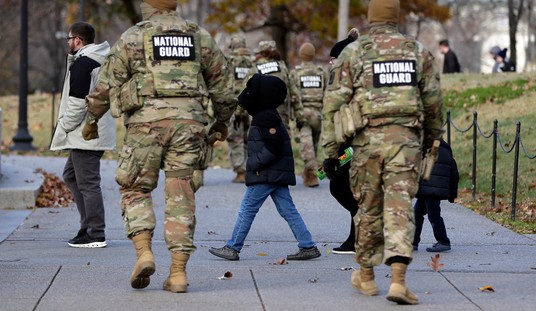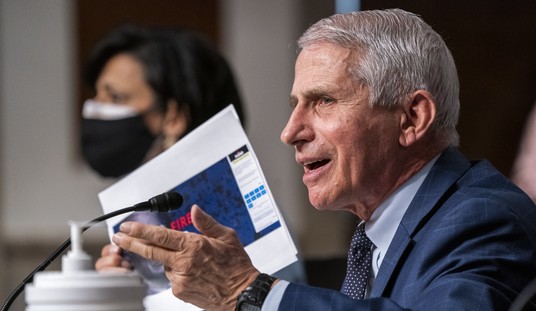No links yet but that’s the screaming headline at ABC News. Their story should be up momentarily; I’ll update below as the wires start moving. An obvious question right out of the chute: Did the launch fail on the pad or in mid-flight? Remember, they launched a long-range (Taepodong) missile in 2006 too and that one failed after 42 seconds in the air, crashing into the Sea of Japan within two minutes.
Needless to say, if this thing landed on the territory of any neighboring countries then the world has itself a “situation.” Stand by.
Update: Here’s the ABC story now. They achieved lift-off, but apparently not much else:
The 90-ton rocket launched and there was a larger than anticipated flare.
U.S. officials said that the missile is belived to have crashed into the sea…
“The main audience for this missile is internal not external,” [former U.S. ambassador to South Korea Donald] Gregg said. “This is [Kim Jong Un’s] way of demonstrating to the people of North Korea he is in charge and his country is capable of high tech things. It is a manifestation of his power.”
It “broke apart” shortly after the launch, U.S. officials tell CNN. Japan was prepared to shoot it down.
Update: According to WaPo, U.S. officials say the test “may” have failed. Hmmmm.
Update: Just three days ago, CNN got a copy of a report by South Korean intel officials claiming there are signs that the North’s preparing for a new nuclear test too.
Update: Yochi Dreazen of National Journal has quickie background on how the U.S. and NK went from a tentative agreement on February 29 to restore food aid in exchange for an end to missile and nuclear tests to the NorKs firing this one off in defiance of western criticism. A provocative theory: Was there a “miscommunication” inside the North Korean government about U.S. intentions?
Flake said he believes North Korea’s government—thrown into disarray by the recent death of its paramount leader, Kim Jong Il—suffered a major communications breakdown, with the Beijing team’s agreement to forgo a satellite launch not adequately conveyed to the political and military leadership back in Pyongyang.
“There was a screw-up within the North Korean government,” Flake said. “It seems likely that the information didn’t flow back correctly.”
Revere, by contrast, believes that North Korea’s top leadership in Pyongyang accurately understood what the two teams had discussed in Beijing but were all the while preparing to ignore the ban on satellite launches. Revere, now a senior director of the Albright Stonebridge Group, believes the North Koreans seriously misjudged the U.S. response.
“The calculation they made was that the other elements of the agreement—like the freeze on uranium enrichment and nuclear weapons testing—would cause the U.S. to moderate its reaction or eventually come back to the table,” he said. “They convinced themselves that those elements were so valuable that the U.S. couldn’t just walk away from the agreement.”
Hard to square the miscommunication theory with the conventional wisdom about Kim going through with this as a show of strength for his domestic audience. Then again, if you assume that he’s largely a figurehead (at least for the moment) and that various military interests are jockeying for position behind the throne, maybe the miscommunication theory isn’t so far-fetched. Could be that the left hand either doesn’t know what the right hand is doing or is acting independently.
Update: A few more technical details from the Journal:
About 90 seconds into flight, roughly the time its first stage should have burned out and second stage kicked in, the rocket flared brightly and apparently exploded, according to ABC News, which cited U.S. defense officials. Parts fell into water near South Korea’s Jeju Island, South Korean media reported.
A South Korean Defense Ministry spokesman said the rocket “seems to have fallen apart” minutes after launch.
A successful flight would have lasted about 10 minutes, with the rocket’s third stage entering space somewhere between the Philippines and Indonesia, according to plans sent by North Korean space officials to international aviation and maritime authorities.
The Security Council will meet as early as tomorrow to issue the obligatory strongly-worded statement.
Update: Let’s say the NorKs had managed to launch this thing without a hitch and that it completed its 10-minute flight path before landing in the ocean. What incentive would leaders in the west (or the east, for that matter) have to report a successful long-range missile test by NK? All it would do is heighten panic over North Korea’s intentions, and the greater the panic, the greater the risk that South Korean or Japanese leaders would be forced into some sort of brinksmanship with Pyongyang that would end in a catastrophic war. The international consensus on NK has typically been to avoid poking the hornet’s nest for fear of what might fly out if you do. Confirming a successful test would, almost necessarily, require subsequent poking. That’s not to say western officials or anyone else are lying about tonight’s launch having gone bust, but I am curious as to why they’d report it accurately if they could keep it quiet and in so doing keep the public off their back while they plot a strategic response. In the interest of avoiding greater bloodshed, the world already looks the other way at the concentration camps run by the Kim family. If they’re willing to grudgingly tolerate something as filthy as that in the name of “peace,” why wouldn’t they fib about a missile test?
Update: Red State’s Jeff Emanuel finds the silver lining.









Join the conversation as a VIP Member